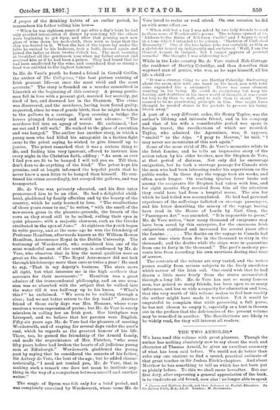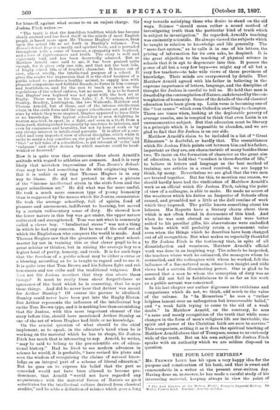THE TWO ARNOLDS.*
WE have read this volume with great pleasure. Though the author has nothing absolutely new to say about the work and character of Thomas Arnold, he gives an excellent summary of what has been said before. We could not do better than refer any one anxious to find a sound, practical estimate of that great teacher to Sir Joshua Fitch's chapters. And about Matthew he has something to tell us which has not been put so plainly before. To this we shall recur hereafter. But our first duty, after expressing a general appreciation of the book, is to vindicate an old friend, now alas ! no longer able to speak • Thomas and Matthew Arnold, and their Influence on English Education. By Sir Joshua Fitch. ILA., LL.D. London ; W. Ileinomann. for himself, against what seems to us an unjust charge. Sir Joshua Fitch writes :— " The truth is that the Arnoldian tradition which has become slowly evolved and has fixed itself in the minds of most English people, is based more upon Mr. Thomas Hughes' romance, than upon the actual life as set forth in Stanley's volumes. Tom Brown's School Days is a manly and spirited book, and is pervaded throughout with a sense of humour, a sympathy with boyhood, and a love of righteousness and truth. The story is well and vigorously told, and has been deservedly admired. But as Matthew Arnold once said to me, it has been praised quite enough, for it gives only one side, and that not the best side, of Rugby school life, or of Arnold's character. It leaves out of view, almost wholly, the intellectual purpose of a school. It gives the reader the impression that it is the chief business of a public school to produce a healthy animal, to supply him with pleasant companions and faithful friends, to foster in him courage and truthfulness, and for the rest to teach as much as the regulations cf the school enforce, but no more. It is to be feared that Hughes' own boyhood was not spent with the best set at Rugby. There were in his time Lake, C. J. Vaughan, Arthur Stanley, Bradley, Lushington, the two Walronds, Matthew and Thomas Arnold, but of these, and of the intense intellectual strain in the sixth form and the upper schoolhouse set, and of the aims by which they were inspired, Hughes appeared to have little or no knowledge. His typical school-boy is seen delighting in wanton mischief, in sport, in a fight, and even in a theft from a farm-yard, distinguished frequently by insolence to inferiors, and even by coarseness and brutality, but not by love of work or by any strong interest in intellectual pursuits. It is after all a one- sided and very imperfect view of ethical discipline, which while it seeks to make a boy sensitive on the point of honour, refusing to ' blab ' or tell tales of a schoolfellow, is yet tolerant of cribs' and
• vulguses ' and other devices by which masters could be hood- winked or deceived."
Now it is quite true that erroneous ideas about Arnold's attitude with regard to athletics are common. And it is very likely that mistaken impressions of Tons Brown's School- days may have had something to do with originating them.
But it is unfair to say that Thomas Hughes is in any way to blame. He did not pretend to draw a picture of the "intense intellectual strain in the sixth form and the
upper schoolhouse set." He did what was far more usefuL He took a much more common type of young humanity than is suggested by the names which Sir Joshua enumerates.
He took the average schoolboy, full of spirits, fond of pleasure and amusement, indifferent to learning, but moved by a certain rudimentary sense of duty. He showed bow the lower nature in this boy was got under, the upper nature cultivated and strengthened. Tom was not what is commonly called a clever boy. "Intellectual stress" was not a thing in which he had any concern. But he was of the stuff out of
which the Englishman who conquers the world is made. And Thomas Hughes saw that the greatness of the great school- master lay not in training this or that clever pupil to be a great scholar or thinker, but in raising the average boy to a higher level of purity, honesty, and truth. It is for such boys that the freedom of a public school may be either a curse or a blessing, according as he is taught to regard and to use it.
It is quite true that Tom Brown and his fellows fight and rob ben-roosts and use cribs and the traditional valguses. But
does not Sir Joshua recollect that they rise above these things ? It must be really from sheer forgetfulness or ignorance of the book which he is censuring, that lie says these things. And did he never hear that Arthur was meant for Arthur Stanley ? Of course the picture is idealised.
Stanley could never have been put into the Rugby Eleven. But Arthur represents the influence of the intellectual boy on the Tom Brown type, and it is nothing less than astonishing that Sir Joshua, with this most important element of the story before him, should have mentioned Arthur Stanley as one of the set of whom Hughes had little or no knowledge.
On the crucial question of what should be the chief
implement, so to speak, in the educator's hand when be is working on the material which he has to shape, Sir Joshua Fitch has much that is interesting to say. Arnold, he writes, "may be said to belong to the pre-scientific era of educa-
tional history." Had he lived to see modern advances in science he would, it is probable, "have revised his plans and seen the wisdom of recognising the claims of natural know- ledge as an integral part of a scheme of liberal education."
But he goes on to express his belief that the part so conceded would not have been allowed to become pre- dominant, that Arnold "would not have regarded any acquaintance with the material forces of Nature as good substitutes for the intellectual culture derived from classical studies," and he adds a definition of science which goes a long way towards satisfying those who desire to stand on the old ways. Science "should mean rather a sound method of investigating truth than the particular kind of truth which is subject to investigation." So regarded, Arnold's teaching was eminently scientific. He always viewed the subjects which he taught in relation to knowledge and life generally. The "mere-fact system," as he calls it in one of his letters, the prizing of information for its own sake, he despised. It is the great objection to the teaching of physical science in schools that it is apt to degenerate into this. It passes the power of all but a very few boys—we might say of all but a very few teachers—to take wide views of these provinces of knowledge. Their minds are overpowered by details. That Matthew Arnold agreed with his father in believing in the supreme importance of letters, language, and the discipline of thought Sir Joshua is careful to tell us. He held that man is dwarfed by the contemplation of Nature, andelevated by thecon- templation of humanity. Some of the details of the old classical education have been given up. Latin verse is becoming one of the "lost causes" which even Oxford is unwilling to champion. There are times when, looking at the deplorable poverty of average results, one is tempted to think that even Latin is an unremunerative subject. But that education must be literary is a principle which it is impossible to abandon, and we are glad to find that Sir Joshua is on our side.
Matthew Arnold's claim to be included in a list of "Great Educators" is doubtful, or hardly that. The resemblances which Sir Joshua Fitch points out between him and his father, important as they are, are characteristic of many besides these two. To insist on the formation of character as the great aim of education, to hold that "conduct is three-fourths of life," to believe in letters and language as the best method of training, are articles in a creed received, we are happy to think, by many. Nevertheless we are glad that the two men are treated together. But for this, to mention one reason, we should hardly have had the vindication of Matthew Arnold's work as an official which Sir Joshua Fitch, taking the point of view of a colleague, is able to make. He made no secret of the weariness which his duties as Inspector of Schools often caused, and grumbled not a little at the dull routine of work which they imposed. The public knows something about his labours. His Reports have a literary charm about them which is not often found in documents of this kind. And when he was sent abroad on missions that were better suited to his peculiar gifts, his observations were embodied in books which will probably retain a permanent value even when the things which he describes have been changed out of all recognition. But what makes us especially thankful to Sir Joshua Fitch is the testimony that, in spite of all dissatisfaction and weariness, Matthew Arnold's official work was done in an inspiring way. The schools he inspected, the teachers whose work he estimated, the managers whom he counselled, and the colleagues with whom he worked, felt the influence of a fine-natured man, whose keen insight and wide views had a certain illuminating power. One is glad to be assured that a man to whom the conception of duty was so much did not fail in faithfulness to it as far as his work as a public servant was concerned.
In his last chapter our author digresses into criticisms and comparisons which do not, we think, add much to the value of the volume. In "In Memoriam" he sees a "rather helpless lament over an unforgotten but irrecoverable belief," and "a weak faith trying to come to the aid of a weak doubt." In Matthew Arnold, on the contrary, he sees "a sane and manly recognition of the truth that while some changes in the form of men's religious life are inevitable, the spirit and power of the Christian faith are sure to survive." This comparison, setting it as it does the spiritual teaching of Matthew Arnold above that of Tennyson, seems to us curiously wide of the truth. But on his own subject Sir Joshua Fitch speaks with an authority which we are seldom disposed to question.











































 Previous page
Previous page